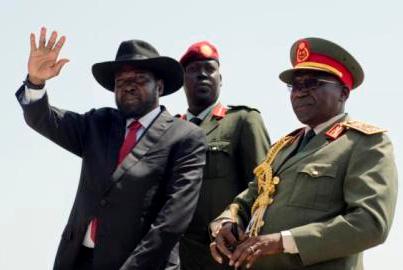South Sudan’s top leadership ordered recent fighting in Juba: UN report
September 9, 2016 (JUBA) – A United Nations confidential report has revealed that the recent renewed fighting in the South Sudanese capital, Juba, from 8 July was ordered by both President Salva Kiir and army chief, Paul Malong Awan.

The United Nations panel of investigation also said the opposition faction led by the former First Vice President, Riek Machar, did not buy ammunitions before the clashes.
The UN panel of experts report quoted by The Associated Press says President Kiir and army chief of staff, Malong, directed the fighting in Juba that killed hundreds, using MI-24 helicopters that only they had the authority to deploy. It cites “numerous reports” from South Sudanese senior military personnel and politicians.
The world body’s report also said Kiir and Malong have been focusing on procuring new weapons and ammunition, including the apparent acquisition of two L-39 fighter jets.
South Sudan’s civilians are “bearing the brunt of the resulting harm” as weapons continue to be procured, the report says. “By the government’s own account, the vast majority of government revenue … has funded security expenses and the war effort, including the procurement of weapons, rather than social services,” AP quoted from the document.
There were conflicting arguments over which side was responsible for the fighting which erupted at the presidential palace as the two top rival leaders were in a meeting to resolve on an earlier incident a day before.
While President Kiir said he did not know what had happened in a press statement on the day of the fighting, he weeks later on said it was a coup attempt by Machar. The opposition leader dismissed the accusation, saying the fighting was a plan by President Kiir and his group to kill him.
Over 300 soldiers, mainly bodyguards, were killed on both sides and the fighting continued a day later into the residence of Machar. He was dislodged and hunted down in the bushes until he crossed into the Democratic Republic of Congo several weeks later.
The UN Security Council has threatened to impose an arms embargo if South Sudan’s government doesn’t comply with a plan to deploy an extra 4,000 peacekeepers to protect civilians.
“The findings of the South Sudan panel of experts show the absurdity of waiting even one more day to impose an arms embargo on South Sudan,” said Louis Charbonneau, UN director at Human Rights Watch.
The report also said officials have focused on “mobilizing their respective tribes,” which has worsened ethnic tensions. The government and rebels’ “arming of communities based on tribal affiliation continues to fuel widespread violence,” it says.
The revelation comes just days after the Security Council visited South Sudan to pressure the government to allow in the 4,000 additional peacekeepers. A joint communique by the council and the government said South Sudan accepted their deployment, but just after the diplomats left, government officials announced conditions including prior approval of troop contributors and what weapons they carry.
The visiting diplomats also pressed South Sudan’s government to hold accountable soldiers who have been accused of rampaging through a hotel compound popular with foreigners in the July chaos.
The new report says 80 to 100 soldiers overran the Terrain compound and “raped and gang-raped at least five international aid workers and an unknown number of staff working at the compound. They also executed John Gatluak, a Nuer employee of the NGO Internews in front of his colleagues in an “ethnically targeted killing.”
South Sudan’s civil war began in December 2013 between supporters of Kiir, an ethnic Dinka, and former Vice President Machar, an ethnic Nuer.
The UN report added: “This attack was well coordinated and cannot be considered as an opportunistic act of violence and robbery.”
(ST)
